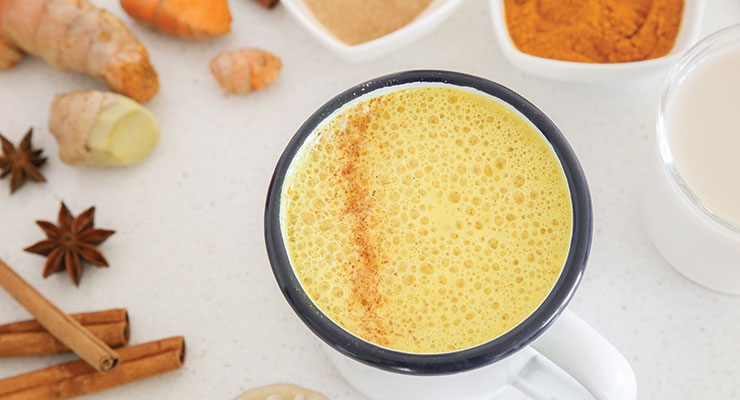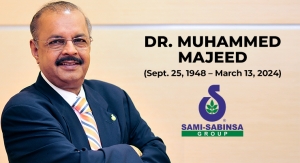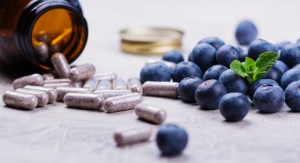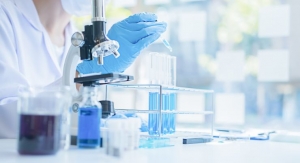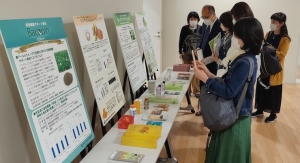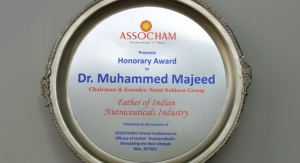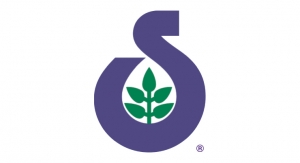Tom Branna, Editorial Director03.01.17
To that seemingly endless list of coffee variants, you know, espresso, cappuccino, flat white and café au lait, add golden latte. Consumers everywhere are slurping down this turmeric-laden concoction in ever-increasing numbers. In fact, “golden milk,” as it’s sometimes known, was one of Google’s top-searched terms in 2016. What’s driving all the interest in all things turmeric? A growing understanding about the benefits of this gold-colored spice and its curcumin derivative.
One nutraceutical industry supplier has played a key role in its popularity. “We were the first to bring curcumin to the nutritional market,” asserted Dr. Muhammed Majeed, founder & chairman, Sabinsa and its sister company, Sami Labs Ltd. “We’ve conducted a lot of research on this material and it has applications in a wide variety of ailments. It is amazing!”
So amazing, in fact, that Dr. Majeed created a $100 million company on turmeric, as well as other Ayurveyda-based, natural materials. The ingredient and its derivatives represent 40% of company sales with more than 6,000 acres under cultivation in India and more opening up on a regular basis. The expansion is necessary to satisfy Sabinsa’s needs for 1,000 tons of turmeric each month. Much of that production is used for Curcumin C3, Sabinsa’s best-selling product.
“It is an anti-inflammatory and anti-arthritic,” explained VG Nair, chief executive officer, Sami Group of Companies. “It is even an adjuvant therapy alongside chemotherapy. It reduces the toxicity of the chemo, improves the efficacy of the treatment and reduces side effects, too.”
According to Sabinsa executives, the therapeutic potential of Curcumin C3 Complex ranges from Alzheimer’s disease, cardiovascular diseases and multiple sclerosis to gallstone and cataract formation.
A Rich History
No surprise then that Sabinsa, based in Bangalore, India, got its start with a single turmeric extract study, recalled Dr. Majeed.
“Now, we have 1,200 people with seven manufacturing units in India and one unit in the U.S.,” explained Dr. Majeed. “We are building a new site in Northeast India focused exclusively on turmeric.”
Dynamic growth has always been a part of Sabinsa. After graduating with a degree in pharmacy from Kerala University, Dr. Majeed emigrated to the U.S. in 1975. He continued his graduate studies in Long Island University, New York (MS) and St. John’s University New York (PhD) specializing in industrial pharmacy. During his career, Dr. Majeed spent 15 years in progressively responsible research positions with Pfizer Inc., Carter-Wallace and Paco Research.
By 1988, Dr. Majeed was ready to bring to market the benefits of Ayurveda-based ingredients with clinical efficacy backed by modern methods. He has established Sabinsa in East Windsor, NJ, where today, the company employs more than 60 people in research and product development.
Global Growth
Company headquarters were moved to Bangalore in 1991 so that Sabinsa and Sami Labs could be at the raw material source of their products. Following that move, Sabinsa began a rapid expansion that led to operations in Utah (U.S.), UAE, Japan, China, Australia, Europe, South Africa, Vietnam, South Korea and Malaysia. In 2016, Sabinsa set up operations in Dubai and Bangladesh. This year, Sabinsa is opening offices throughout Southeast Asia; specifically, Indonesia, Philippines, Thailand and Vietnam.
“No one can afford to ignore Southeast Asia,” observed Dr. Majeed.
During the past two decades, the company has entered a variety of fields. In 1995, Dr. Majeed founded America’s Finest, Inc., which offers dietary supplements, and Sanutra Wellness, a maker of condition-specific dietary supplements. Four years later, Dr. Majeed created Sami Spices, which offers spice oils, oleoresins, herbal extracts as well as a variety of nutraceutical preparations. That same year, Organica Aromatics India was founded to serve the global flavor and fragrance industry.
Raw materials for the nutrition, cosmetic and pharmaceutical industries may be Sami’s primary business, but the company also has activities in many other fields. For instance, ClinWorld Ltd., formed in 2003, provides an array of clinical trials services, all conducted in compliance with the ICH-GCP guidelines.
In other areas, Edkal IT Solutions (2005) provides data migration services, and software and applications development. MM Corporate Security Services and M&S Realty followed (2007).
But for all his far-flung business ventures, Dr. Majeed is most proud of his eponymous foundation. Founded in 2004, Dr. Majeed Foundation educates underprivileged children in India. Two training centers, in Cochin, Kerala and Kunigal, Karnataka, have educated thousands of children in MS Office and Desktop application software. Now, Dr. Majeed wants to do even more on a larger scale.
“We are in the process of expanding the program into the U.S.,” he asserted.
A Potent Lineup
While Curcumin C3 is No. 1 in the company’s product lineup, LactoSpore is gaining in popularity. This commercial probiotic preparation helps users maintain a normal, healthy and balanced microbial population in the gastro-intestinal tract. Last year, Health Canada issued a Product License to enable Sabinsa to make a significant health claim, “Helps relieve abdominal pain associated with IBS (Irritable Bowel Syndrome),” for its LactoSpore Balance formula.
For the nutritional market, Sabina’s product range includes Bacopin to improve memory and cognition, Boswellin to reduce inflammation, Fabenol to inhibit starch digestion, ForsLean for lean body mass, GarCitrin to inhibit fat synthesis and suppress appetite, Glabridin to inhibit melanogenesis, Gugulipid to prevent and treat abnormal cell growth and inflammation proliferation, and Saberry to promote digestion. But regardless of the ingredient, all Sami Labs’ ingredients pass rigorous efficacy tests, according to company executives.
In-Depth Analysis
Gone are the days when suppliers could submit a two-line statement about their ingredient, according to Shaheen Majeed, marketing director.
“I remember when color and an assay amount, which may not have been verified, was all that was looked for. I can tell you now that our certificates of analysis are three pages long; extensive testing and several parameters have to be met before supplying a customer. The regulatory world in both our nutrition and cosmetic industries have become more stringent and more demanding in terms of the analysis, safety and efficacy.”
As a result, the company’s laboratories and facilities in New Jersey and Utah, and throughout India all help to deliver some of the best ingredients and finished formulas possible, he added.
A Global Presence
Still, Dr. Majeed knew that nature would be the foundation of the company’s success, and in 1991, he founded Sami Labs Ltd. in Bangalore, India. The Research & Development Center of the company was established in Peenya, Bangalore in 1998. This Center of Excellence employs over 100 senior scientists of which more than 40 are PhDs and houses some of the most modern and sophisticated analytical equipment of the highest standards for the pharmaceutical, nutraceutical and cosmeceutical industries.
Over the years, the company has continued to expand its facilities in every country it operates. According to Shaheen Majeed, the New Jersey facility serves as the main logistics and accounting office for Sabinsa USA. It also has several sales executives who handle the East Coast of the U.S.
“It also serves as our main development center for cosmeceutical and international businesses. With the expanded East Windsor facility, we’re able to bring back research and development to the U.S. where we can do some analysis of ingredients and products,” explained Shaheen Majeed. “Much like what takes place in the analytical department of our Peenya, Bangalore site, this does the same analytical work, but in a much smaller capacity.”
Currently, the high-performance liquid chromatography (HPLC) equipment at both the New Jersey and Utah sites does wonders for Sami in terms of analyzing ingredients and finished goods produced in Utah.
The company produces, on an average, 30 tons of Curcumin C3 Complex a month, with monthly production climbing as high as 40 tons, according to company executives. The product has a wide range of therapeutic potential, ranging from cardiovascular disease and Alzheimer’s disease to arthritis and diabetes.
When golden lattes start appearing on coffee shop menus, it is clear that turmeric’s popularity is on the rise, but Sabinsa executives are quick to point out that not all curcumin sold around the world is equal. In fact, an Indian competitor was exporting product to the U.S. that contained 43% synthetic curcumin. Another competitor exported 100% synthetic curcumin to Singapore, claiming to be natural curcumin. In contrast, Sabinsa’s Curcumin C3 Complex is 100% natural—and the company spends $700 to test every batch at designated synthetic testing labs, such as the University of Georgia.
Effective Products
That kind of dedication to quality ensures the efficacy of raw materials, noted company executives. Meanwhile, Sabinsa has conducted hundreds of research studies to prove the efficacy of its finished products as well. For example, last month, a study on Sabinsa’s Curcumin C3 Complex and BioPerine in combination was published in Inflammopharmacology. The study, “Antioxidant effects of curcuminoids in patients with type 2 diabetes mellitus: a randomized controlled trial,” explored the benefits of Curcumin C3 Complex in reducing oxidative stress in patients suffering from type 2 diabetes. According to Sabinsa, oxidative stress is known to play a role in the development of type 2 diabetes, and conditions related to hyperglycemia also contribute to oxidative stress. Diabetes is estimated to afflict about 8.3% of the U.S. population and costs the economy $245 billion a year. In this 2016 paper on the results of a clinical trial involving 118 type 2 diabetes subjects, a daily does of C3 Complex (1 g) and BioPerine (10 mg) for three months significantly reduced serum malondialdehyde (MDA) with increase in serum total antioxidant capacity (TAC) and the activity of superoxide dismutase (SOD) in patients with type 2 diabetes. The study was designed as a randomized, double-blind, placebo-controlled trial with a parallel-group design.
“Diminution of the well-marker of oxidative stress, MDA, as well as the increase in TAC and SOD, body’s natural and most powerful antioxidant enzymes, are prized goals indicative of the body’s response to undo the damage wreaked by hyperglycemia,” explained Nagabhushanam Kalyanam, president, R&D, Sabinsa. “The growing body of science indicates this combination can play a significant role in supporting the health of diabetes patients, and we intend to pursue this line of study further.”
Sabinsa offers a variety of products to further improve diabetic patient outcomes. For example, in a clinical study to measure the efficacy of its Diabetic Bar, Sabinsa reported that regular consumption of three bars a day resulted in gradual decline in blood fasting glucose levels and levels of glycosylated hemoglobin.
The company noted that black pepper is considered the “King of Spices” throughout the world due to its pungent principle piperine. Sabinsa’s BioPerine is a patented extract obtained from black pepper fruits (Piper nigrum) standardized to a minimum 95% piperine. BioPerine has been used as a bioavailability enhancer for more than 20 years. According to Sabinsa, BioPerine may be co-administered with various nutrients to enhance their bioavailability in both humans and animals. In general, BioPerine was found to enhance absorption of nutrients by at least 30%.
Earlier this year, Sabinsa’s multi-enzyme complex DigeZyme, a proprietary blend of non-animal sourced enzymes, was shown to have the potential for more rapid recovery from Delayed Onset Muscle Soreness (DOMS) in a study published in Sports Nutrition and Therapy.
In this randomized, double-blind, placebo-controlled prospective trial on 20 healthy male subjects, the analgesic effect of DigeZyme in management of DOMS were compared to placebo. Supplementation with 50 mg of DigeZyme three times a day demonstrated significant improvement in both subjective pain and muscle tenderness after eccentric exercise. This study establishes the role of DigeZyme in sports nutrition, especially as a post-exercise recovery supplement, according to company executives.
“This new study, gives a new twist to a classic product of ours, DigeZyme,” said Shaheen Majeed. “Well known for use in digestive health, we have now studied DigeZyme for this specific sports indication. Enzymes have been part of the sports supplements category, and DigeZyme has enjoyed its place in many sports products, mainly to have enzymes breakdown proteins and carbohydrates. Sabinsa has now given an additional clinical indication that no other enzyme blend has done before—DOMS. Our blend for this indication is now patent pending.”
In fact, Sabinsa has more than 130 patents and more than 150 patents pending throughout the world. Thanks to its superior research that results in superior products, Sabinsa is positioned to maintain double-digit growth for years to come—even if golden lattes someday fall out of favor with the fashionable, yet fickle, caffeine set!
One nutraceutical industry supplier has played a key role in its popularity. “We were the first to bring curcumin to the nutritional market,” asserted Dr. Muhammed Majeed, founder & chairman, Sabinsa and its sister company, Sami Labs Ltd. “We’ve conducted a lot of research on this material and it has applications in a wide variety of ailments. It is amazing!”
So amazing, in fact, that Dr. Majeed created a $100 million company on turmeric, as well as other Ayurveyda-based, natural materials. The ingredient and its derivatives represent 40% of company sales with more than 6,000 acres under cultivation in India and more opening up on a regular basis. The expansion is necessary to satisfy Sabinsa’s needs for 1,000 tons of turmeric each month. Much of that production is used for Curcumin C3, Sabinsa’s best-selling product.
“It is an anti-inflammatory and anti-arthritic,” explained VG Nair, chief executive officer, Sami Group of Companies. “It is even an adjuvant therapy alongside chemotherapy. It reduces the toxicity of the chemo, improves the efficacy of the treatment and reduces side effects, too.”
According to Sabinsa executives, the therapeutic potential of Curcumin C3 Complex ranges from Alzheimer’s disease, cardiovascular diseases and multiple sclerosis to gallstone and cataract formation.
A Rich History
No surprise then that Sabinsa, based in Bangalore, India, got its start with a single turmeric extract study, recalled Dr. Majeed.
“Now, we have 1,200 people with seven manufacturing units in India and one unit in the U.S.,” explained Dr. Majeed. “We are building a new site in Northeast India focused exclusively on turmeric.”
Dynamic growth has always been a part of Sabinsa. After graduating with a degree in pharmacy from Kerala University, Dr. Majeed emigrated to the U.S. in 1975. He continued his graduate studies in Long Island University, New York (MS) and St. John’s University New York (PhD) specializing in industrial pharmacy. During his career, Dr. Majeed spent 15 years in progressively responsible research positions with Pfizer Inc., Carter-Wallace and Paco Research.
By 1988, Dr. Majeed was ready to bring to market the benefits of Ayurveda-based ingredients with clinical efficacy backed by modern methods. He has established Sabinsa in East Windsor, NJ, where today, the company employs more than 60 people in research and product development.
Global Growth
Company headquarters were moved to Bangalore in 1991 so that Sabinsa and Sami Labs could be at the raw material source of their products. Following that move, Sabinsa began a rapid expansion that led to operations in Utah (U.S.), UAE, Japan, China, Australia, Europe, South Africa, Vietnam, South Korea and Malaysia. In 2016, Sabinsa set up operations in Dubai and Bangladesh. This year, Sabinsa is opening offices throughout Southeast Asia; specifically, Indonesia, Philippines, Thailand and Vietnam.
“No one can afford to ignore Southeast Asia,” observed Dr. Majeed.
During the past two decades, the company has entered a variety of fields. In 1995, Dr. Majeed founded America’s Finest, Inc., which offers dietary supplements, and Sanutra Wellness, a maker of condition-specific dietary supplements. Four years later, Dr. Majeed created Sami Spices, which offers spice oils, oleoresins, herbal extracts as well as a variety of nutraceutical preparations. That same year, Organica Aromatics India was founded to serve the global flavor and fragrance industry.
Raw materials for the nutrition, cosmetic and pharmaceutical industries may be Sami’s primary business, but the company also has activities in many other fields. For instance, ClinWorld Ltd., formed in 2003, provides an array of clinical trials services, all conducted in compliance with the ICH-GCP guidelines.
In other areas, Edkal IT Solutions (2005) provides data migration services, and software and applications development. MM Corporate Security Services and M&S Realty followed (2007).
But for all his far-flung business ventures, Dr. Majeed is most proud of his eponymous foundation. Founded in 2004, Dr. Majeed Foundation educates underprivileged children in India. Two training centers, in Cochin, Kerala and Kunigal, Karnataka, have educated thousands of children in MS Office and Desktop application software. Now, Dr. Majeed wants to do even more on a larger scale.
“We are in the process of expanding the program into the U.S.,” he asserted.
A Potent Lineup
While Curcumin C3 is No. 1 in the company’s product lineup, LactoSpore is gaining in popularity. This commercial probiotic preparation helps users maintain a normal, healthy and balanced microbial population in the gastro-intestinal tract. Last year, Health Canada issued a Product License to enable Sabinsa to make a significant health claim, “Helps relieve abdominal pain associated with IBS (Irritable Bowel Syndrome),” for its LactoSpore Balance formula.
For the nutritional market, Sabina’s product range includes Bacopin to improve memory and cognition, Boswellin to reduce inflammation, Fabenol to inhibit starch digestion, ForsLean for lean body mass, GarCitrin to inhibit fat synthesis and suppress appetite, Glabridin to inhibit melanogenesis, Gugulipid to prevent and treat abnormal cell growth and inflammation proliferation, and Saberry to promote digestion. But regardless of the ingredient, all Sami Labs’ ingredients pass rigorous efficacy tests, according to company executives.
In-Depth Analysis
Gone are the days when suppliers could submit a two-line statement about their ingredient, according to Shaheen Majeed, marketing director.
“I remember when color and an assay amount, which may not have been verified, was all that was looked for. I can tell you now that our certificates of analysis are three pages long; extensive testing and several parameters have to be met before supplying a customer. The regulatory world in both our nutrition and cosmetic industries have become more stringent and more demanding in terms of the analysis, safety and efficacy.”
As a result, the company’s laboratories and facilities in New Jersey and Utah, and throughout India all help to deliver some of the best ingredients and finished formulas possible, he added.
A Global Presence
Still, Dr. Majeed knew that nature would be the foundation of the company’s success, and in 1991, he founded Sami Labs Ltd. in Bangalore, India. The Research & Development Center of the company was established in Peenya, Bangalore in 1998. This Center of Excellence employs over 100 senior scientists of which more than 40 are PhDs and houses some of the most modern and sophisticated analytical equipment of the highest standards for the pharmaceutical, nutraceutical and cosmeceutical industries.
Over the years, the company has continued to expand its facilities in every country it operates. According to Shaheen Majeed, the New Jersey facility serves as the main logistics and accounting office for Sabinsa USA. It also has several sales executives who handle the East Coast of the U.S.
“It also serves as our main development center for cosmeceutical and international businesses. With the expanded East Windsor facility, we’re able to bring back research and development to the U.S. where we can do some analysis of ingredients and products,” explained Shaheen Majeed. “Much like what takes place in the analytical department of our Peenya, Bangalore site, this does the same analytical work, but in a much smaller capacity.”
Currently, the high-performance liquid chromatography (HPLC) equipment at both the New Jersey and Utah sites does wonders for Sami in terms of analyzing ingredients and finished goods produced in Utah.
The company produces, on an average, 30 tons of Curcumin C3 Complex a month, with monthly production climbing as high as 40 tons, according to company executives. The product has a wide range of therapeutic potential, ranging from cardiovascular disease and Alzheimer’s disease to arthritis and diabetes.
When golden lattes start appearing on coffee shop menus, it is clear that turmeric’s popularity is on the rise, but Sabinsa executives are quick to point out that not all curcumin sold around the world is equal. In fact, an Indian competitor was exporting product to the U.S. that contained 43% synthetic curcumin. Another competitor exported 100% synthetic curcumin to Singapore, claiming to be natural curcumin. In contrast, Sabinsa’s Curcumin C3 Complex is 100% natural—and the company spends $700 to test every batch at designated synthetic testing labs, such as the University of Georgia.
Effective Products
That kind of dedication to quality ensures the efficacy of raw materials, noted company executives. Meanwhile, Sabinsa has conducted hundreds of research studies to prove the efficacy of its finished products as well. For example, last month, a study on Sabinsa’s Curcumin C3 Complex and BioPerine in combination was published in Inflammopharmacology. The study, “Antioxidant effects of curcuminoids in patients with type 2 diabetes mellitus: a randomized controlled trial,” explored the benefits of Curcumin C3 Complex in reducing oxidative stress in patients suffering from type 2 diabetes. According to Sabinsa, oxidative stress is known to play a role in the development of type 2 diabetes, and conditions related to hyperglycemia also contribute to oxidative stress. Diabetes is estimated to afflict about 8.3% of the U.S. population and costs the economy $245 billion a year. In this 2016 paper on the results of a clinical trial involving 118 type 2 diabetes subjects, a daily does of C3 Complex (1 g) and BioPerine (10 mg) for three months significantly reduced serum malondialdehyde (MDA) with increase in serum total antioxidant capacity (TAC) and the activity of superoxide dismutase (SOD) in patients with type 2 diabetes. The study was designed as a randomized, double-blind, placebo-controlled trial with a parallel-group design.
“Diminution of the well-marker of oxidative stress, MDA, as well as the increase in TAC and SOD, body’s natural and most powerful antioxidant enzymes, are prized goals indicative of the body’s response to undo the damage wreaked by hyperglycemia,” explained Nagabhushanam Kalyanam, president, R&D, Sabinsa. “The growing body of science indicates this combination can play a significant role in supporting the health of diabetes patients, and we intend to pursue this line of study further.”
Sabinsa offers a variety of products to further improve diabetic patient outcomes. For example, in a clinical study to measure the efficacy of its Diabetic Bar, Sabinsa reported that regular consumption of three bars a day resulted in gradual decline in blood fasting glucose levels and levels of glycosylated hemoglobin.
The company noted that black pepper is considered the “King of Spices” throughout the world due to its pungent principle piperine. Sabinsa’s BioPerine is a patented extract obtained from black pepper fruits (Piper nigrum) standardized to a minimum 95% piperine. BioPerine has been used as a bioavailability enhancer for more than 20 years. According to Sabinsa, BioPerine may be co-administered with various nutrients to enhance their bioavailability in both humans and animals. In general, BioPerine was found to enhance absorption of nutrients by at least 30%.
Earlier this year, Sabinsa’s multi-enzyme complex DigeZyme, a proprietary blend of non-animal sourced enzymes, was shown to have the potential for more rapid recovery from Delayed Onset Muscle Soreness (DOMS) in a study published in Sports Nutrition and Therapy.
In this randomized, double-blind, placebo-controlled prospective trial on 20 healthy male subjects, the analgesic effect of DigeZyme in management of DOMS were compared to placebo. Supplementation with 50 mg of DigeZyme three times a day demonstrated significant improvement in both subjective pain and muscle tenderness after eccentric exercise. This study establishes the role of DigeZyme in sports nutrition, especially as a post-exercise recovery supplement, according to company executives.
“This new study, gives a new twist to a classic product of ours, DigeZyme,” said Shaheen Majeed. “Well known for use in digestive health, we have now studied DigeZyme for this specific sports indication. Enzymes have been part of the sports supplements category, and DigeZyme has enjoyed its place in many sports products, mainly to have enzymes breakdown proteins and carbohydrates. Sabinsa has now given an additional clinical indication that no other enzyme blend has done before—DOMS. Our blend for this indication is now patent pending.”
In fact, Sabinsa has more than 130 patents and more than 150 patents pending throughout the world. Thanks to its superior research that results in superior products, Sabinsa is positioned to maintain double-digit growth for years to come—even if golden lattes someday fall out of favor with the fashionable, yet fickle, caffeine set!

